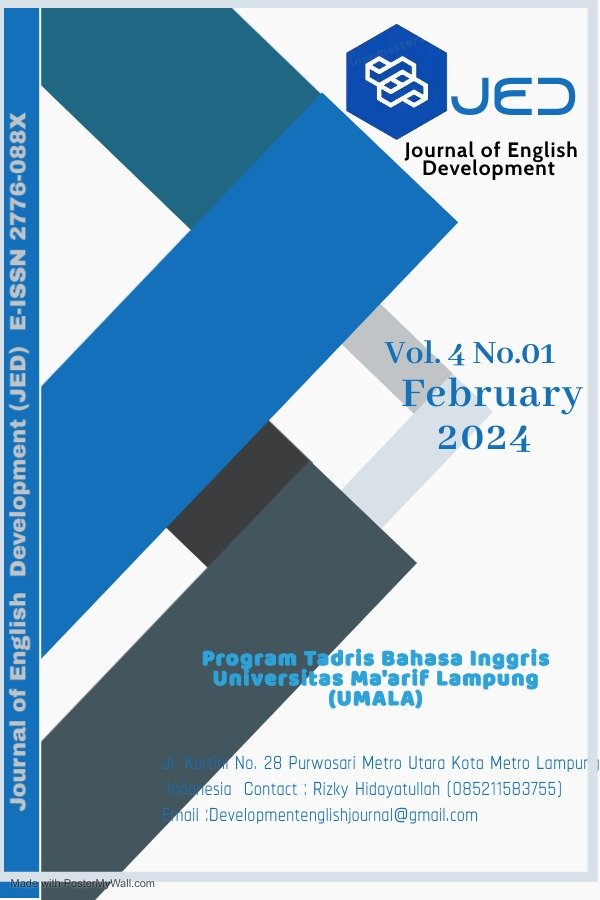The Analysis of Moral Values Found in “It Ends with Us” Novel by Colleen Hoover
English
DOI:
https://doi.org/10.25217/jed.v4i01.4384Keywords:
Moral Values, Novel AnalysisAbstract
This study aimed to find moral values in the novel entitled “It Ends with Us” by Colleen Hoover. This study was used qualitative method where researcher conduct analysis of the intrinsic elements and moral values. Researcher used triangulation to enhance the accuracy of the study which focused on focus group discussion (FGD) and interviews. Based on the findings, and the results of FGD and interviews, it can be stated that solid intrinsic elements help construct the story very well, therefore it becomes interesting story for its readers in many countries. There are several moral values obtained from the novel, they are modesty, honesty, love and affection, bravery, sympathetic to others, kind-hearted, and sincerity. These moral values will be very important for students as the next generations of Indonesia. If these moral values are instilled into students, it is hoped that their morals will be improved gradually. Therefore, the target of the Mandate of the National Education System Law No. 20 of 2003 to develop students' potentials to become men of faith and fear of God Almighty, noble, capable, creative, independent, and democratic and accountable citizens can be obtained.
References
Abrams, D. (2010). Equality and Human Rights Commission Research Report Series, Processes and Prejudice: Theory, Evidence, and Intervention. Manchester: Equality and Human Rights Commission.
Ardayati, & Rahayu, A. (2017). AN ANALYSIS OF THE INTRINSIC ELEMENTS AND MORAL VALUES IN TETSUKO KUROYANAGI’S NOVEL “‘TOTTO CHAN: THE LITTLE GIRL AT THE WINDOW.’” English Community Journal, 1(2), 65–68.
Ariani, D. (2022). Moral values found in the novel entitled everything I never told you by Celeste Ng. Palembang: PGRI University.
Buzan, T. (2003). Sepuluh cara jadi orang yang cerdas secara spiritual [Ten ways to be spiritually intelligent]. Jakarta: PT Gramedia Pustakan Utama.
Creswell, J. (2012). Fourth Edition: Educational-Research - Planning, Conducting, and Evaluating, Quantitative and Qualitative Research.
Collie, J., & Slater, S. (1987). LITERATURE IN THE LANGUAGE CLASSROOM. Cambridge: Cambridge University Press.
Fraenkel, J. et al. (2012). How to Design and Evaluate Research in Education, 8th Edition - Copy. McGrow-Hill.
Hajar, I. (2020). Incorporating Character Values in Indonesian EFL Context. In Journal of English Teaching Studies (Vol. 2, Issue 2).
Hoover, C. (2016). It Ends with Us. London: Simon & Schuster, Inc.
Indartono, S. (2011). THE EFFECT OF E-LEARNING ON CHARACTER BUILDING: PROPOSITION FOR ORGANIZATIONAL BEHAVIOR COURSE.
Muassomah, Abdullah, I., Istiadah, Mujahidin, A., Masnawi, N., & Sohrah. (2020). Believe in Literature: Character Education for Indonesia’s Youth. Universal Journal of Educational Research, 8(6), 2223–2231. https://doi.org/10.13189/ujer.2020.080605
Richards, J. C., & Rodgers, T. S. (2014). Approaches and Methods in Language Teaching. Cambridge: Cambridge University Press.
Sihombing, S. O. (2014). IDENTIFYING CURRENT VALUES OF INDONESIAN YOUTH. www.crisisgroup.org
Sihombing, S. O. (2018). Youth perceptions toward corruption and integrity: Indonesian context. Kasetsart Journal of Social Sciences, 39(2), 299–304. https://doi.org/10.1016/j.kjss.2018.03.004
Simaibang, B. (2017). English Language Teaching in a Foreign Situation. Palembang: Citra Books Indonesia.

Downloads
Published
How to Cite
Issue
Section
License
Copyright (c) 2024 Esi Marlini, Tahrun, Masagus Firdaus

This work is licensed under a Creative Commons Attribution-ShareAlike 4.0 International License.





